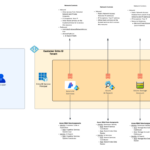
Simple Patterns for Chatting with Your Data – Pattern 1 – Using the Microsoft public backbone
May 16, 2025In today’s rapidly evolving tech landscape, organizations often need to migrate databases due to cost, performance, or scalability needs. While migrations between similar systems (e.g., SQL Server to SQL Server) are relatively simple, heterogeneous migrations—like Oracle to SQL—are significantly more complex. Key challenges include differences in schema and data types, SQL dialects, and the need to translate embedded business logic (e.g., PL/SQL), along with performance tuning and other considerations
While the SQL Server Migration Assistant (SSMA) has long been the go-to tool for this task—equipped with a powerful rule engine and hundreds of conversion rules, however edge cases, custom logic, and nuanced syntax often require manual intervention, slowing down projects and increasing the risk of errors.
That’s why we’re excited to introduce the Copilot in SSMA (preview)—an AI-powered assistant built into SSMA that brings the power of large language models (LLMs) to your migration workflow.
🤖 Why Code Conversion Copilot?
The Code Conversion Copilot is designed to augment SSMA’s rule engine with intelligent, context-aware code transformation capabilities. It leverages state-of-the-art LLMs like GPT-4o, GPT-4.1, o3-mini, and o4-mini to understand, explain, and rewrite complex PL/SQL code into SQL Server-compatible T-SQL.
This isn’t just about automation—it’s about collaboration. The Copilot acts like a knowledgeable peer, helping you reason through tricky conversions, offering suggestions, and even explaining its logic so you can make informed decisions.
✨ Key Features
Multi-Model Support for Flexible Reasoning
The Copilot supports a range of LLMs that is available in Azure OpenAI tailored to different needs:
- GPT-4.1mini for the most cost-effective inference
- GPT-4.1, GPT-4o for better performance on complex code and cost-effective inference. GPT-4.1 also highly specialized in coding tasks.
- o3-mini, o4-mini for deeper reasoning effort in inference and code understanding.
This flexibility allows users to choose the right model for the task—whether it’s a quick fix or a deep dive into legacy code.
Code Explainability: Understand the Why
One of the most powerful features of the Copilot is its ability to explain its decisions. For every transformation, it can:
- Identify the root cause of the issue
- Describe the logic behind the fix
This transparency builds trust and helps developers learn from the AI’s suggestions, making it a valuable tool for both migration and upskilling.
Side-by-Side Code Comparison
The Copilot allows you to compare:
- The original SSMA-generated code
- The Copilot-enhanced version
This side-by-side view makes it easy to validate changes, spot improvements, and ensure that the final output aligns with your coding standards and business logic.
Prompt Customization for Domain-Specific Intelligence
Every enterprise has its own coding patterns, naming conventions, and domain-specific logic. The Copilot supports custom prompts, allowing you to inject internal knowledge into the conversion process.
For example, you can guide the Copilot with:
- Business rules
- Naming conventions
- Known architectural patterns
This makes the AI smarter about your environment and more aligned with your expectations.
How to use Code Conversion Copilot
To learn more , Copilot in SSMA
🧩 Built for the Real World
The Code Conversion Copilot isn’t just a proof of concept—it’s built for production use. It integrates seamlessly into SSMA, supports real-world Oracle workloads, and is designed to scale with your migration needs.
Whether you’re modernizing a single application or migrating hundreds of databases, the Copilot helps you move faster, with more confidence, and less manual effort.
Copilot experience is available in SSMA for Oracle only.
Downloads
Supported sources and target versions
Source: For the list of supported sources, please review the information on the Download Center for each of the above SQL Server Migration Assistant downloads.
Target: SQL Server 2016, SQL Server 2017, SQL Server 2019, SQL 2022, Azure SQL Database, and Azure SQL Database managed instance
